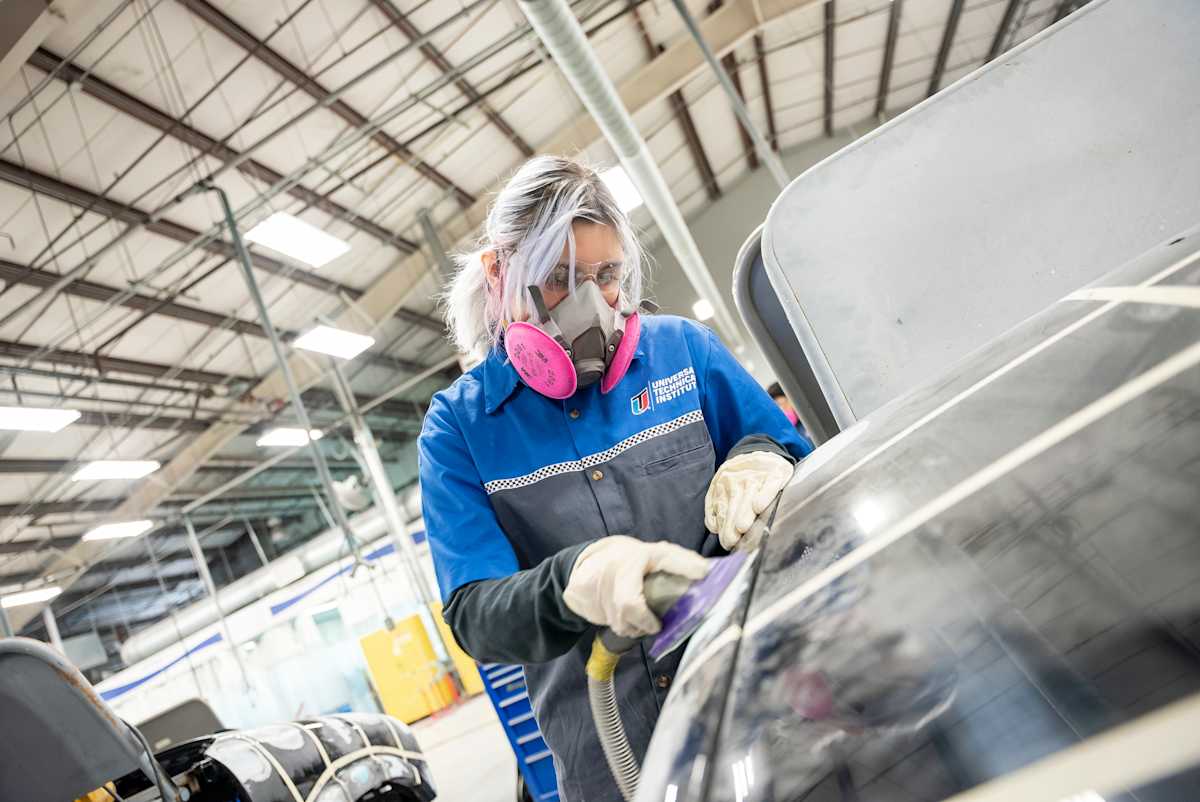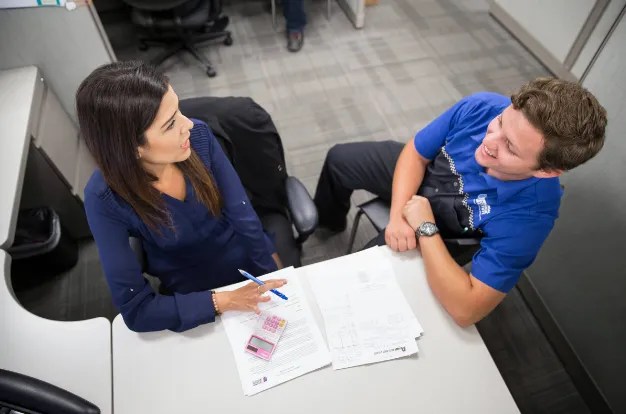Table of Contents
- Auto Body Technician Requirements
- 5 Steps To Become a Certified Automotive Body Technician
Key Points
- Some aspiring automotive body technicians pursue on-the-job training, but the Bureau of Labor Statistics (BLS) reports that most employers prefer candidates who’ve graduated from a formal automotive body training program.1
- Training programs typically last six months to two years and combine hands-on learning with theoretical instruction, covering topics like welding, painting, damage analysis and estimating.
- While certification isn’t mandatory, it is recommended. It can help you stand out in an otherwise competitive field. National Institute for Automotive Service Excellence (ASE) and Inter-Industry Conference on Auto Collision Repair (I-CAR) credentials are two employer-valued certifications.
- According to the BLS, the median annual salary for automotive body technicians in Texas was $48,330 in May 2023. This means half earned more and half earned less. Keep in mind that salary depends on several factors, including experience, employer, demand and cost of living in the area.
- UTI Houston offers two automotive body technician programs: Collision Repair & Refinish Technology (CRRT) for 51 weeks and Collision Repair & Refinish Technology (CRRT) + Estimating for 54 weeks. Both teach courses developed alongside industry leaders like I-CAR, 3M, Audatex, Axalta and more.
Did you know there were over 550,000 car accidents in Texas in 2023? With more than 25 million registered vehicles in Texas, the state’s busy roadways call for skilled automotive body technicians!
Auto body techs, sometimes called collision repair technicians, are trained professionals who help restore collision-damaged vehicles to their original condition.
It’s an important role where no two days are the same. If this sounds like something you’d enjoy, keep reading. In this guide, we’ll share how to become an auto body technician in Texas in five steps!
Auto Body Technician Requirements
Collision repair requires technical skills that may be difficult to acquire outside a formal training program. While some aspiring automotive body technicians pursue on-the-job training, the Bureau of Labor Statistics (BLS) reports that most employers prefer candidates who’ve graduated from an automotive body training program.1

Training programs typically last six months to two years and combine hands-on learning with theoretical instruction, covering topics like welding, painting, damage analysis and estimating. These courses provide candidates with foundational knowledge they can build on throughout their careers and use to test for industry-standard certifications!
There are several types of auto body training programs in Texas. Learn how to find the right one for you in our five-step guide.
5 Steps To Become a Certified Automotive Body Technician
1. Research the career path
Before you settle on a school, it’s important to have a comprehensive overview of what automotive body technicians do. On a high level, auto body techs restore vehicles damaged in a car crash to their original condition. However, their job requires more than remedying dents and mixing paint.
They are skilled professionals who perform detailed damage analyses, interact with customers, communicate with insurance companies and search for hidden damage. Other collision repair tech skills include:
- Panel alignment, repair and replacement
- Welding and cutting
- Refinishing
- Paint prep
- Custom paint repair
- Custom body repair
This honorable career path is a mix of science, art and helping others. If this sounds like your kind of thing, proceed to step two!
2. Compare different automotive body technician schools
As mentioned, Texas is brimming with collision repair schools. Finding the right one can feel overwhelming. Narrow down your choices by asking these questions:
- Is the program accredited by a governing body or organization?
- Do courses include hands-on and theoretical instruction? Do students practice using industry tools and technology?
- What are the instructors' qualifications and experience?
- What is the learning environment like? Will I receive one-on-one instruction?
- What credentials can I earn, and how does the program prepare students for employer-preferred certifications?
- Will you help me look for a job? What auto body shops do you have relationships with?
- Will I be required to take gen ed courses? Are flexible class schedules available?
- How soon can I get trained and start pursuing roles in the field?
- How much is the program, and do you have financial aid?
- What do current and former students say about the program? What do employers say about graduates from the program?
Scheduling a campus tour is another great way to gauge whether or not the school is a good fit. At Universal Technical Institute’s (UTI) automotive body technician school in Houston, Texas, you can meet instructors, walk through labs, and potentially observe learning during a tour.
3. Enroll in auto body technician training
Now that you’ve found the right school, it’s time to enroll and get serious. The best trade schools simulate the real world while creating a safe place to fail.
Don’t be afraid to participate in challenging projects, ask questions and take risks. Danny Palmer, an instructor of UTI’s automotive body program shared, "We'll give you as much knowledge as we have – it's up to you to take it and do what you want with it."

Building relationships with your instructors and classmates is another way to set yourself up for success. Sooner or later, these relationships may prove important in your career! Deepen these relationships by attending school events, where you’ll have opportunities to network with instructors, classmates and employers!
4. Test for automotive body certification
While certification isn’t mandatory, it can help you stand out in an otherwise competitive field. Some employers may require it. There are two credentials worth pursuing early on in your career.
The first is from the National Institute for Automotive Service Excellence (ASE). The organization hosts a Collision Repair & Refinish Certification, as well as a Damage Analysis & Estimating Certification test.
An automotive body training program accredited by the ASE Education Foundation, like the one at UTI Houston, can help you prepare for these tests.
Inter-Industry Conference on Auto Collision Repair (I-CAR) certifications are also highly valued. I-CAR is the provider of collision repair training standards as defined by industry car manufacturers, insurance companies and employers.
I-CAR helped UTI Houston develop their collision repair courses, and our students graduate recognized as I-CAR ProLevel individuals with these I-CAR certificates:1
- Non-Structural Technician Level 1
- Steel Structural Technician Level 1
- Aluminum Structural Technician Level 1
- Estimating Level 1
- Refinish Technician Level 2
5. Pursue opportunities in the field
Once you complete training you can begin pursuing opportunities in the field! First, create an automotive body technician resume that highlights the technical skills, certifications and hands-on experience you’ve acquired.
Next, reach out to your school’s employment assistance team. UTI’s Career Services Advisors help students search for roles and practice interviewing.1

You may also browse online job boards and industry-specific sites or walk into body shops to learn what they’re looking for!
Automotive Body Technician Career Outlook in Texas
Texas’ high number of vehicles makes it a good region to pursue an automotive body technician career. In fact, the BLS reported a total of 14,810 automotive body and related repairers in Texas in May 2023!
Automotive body technicians in Texas can pursue several paths, depending on their training and interests. Entry-level roles include:77
As with any industry, over time, you may be able to advance in your career with hard work and experience. Examples of advanced roles include:
- Non-structural technician
- Steel structural technician
- Aluminum structural technician
- Auto physical damage appraiser
- Electrical/mechanical technician
- Shop manager
- Shop owner
READ: COLLISION REPAIR JOBS OPPORTUNITES & OUTLOOK
Auto Body Technician Salary in Texas
According to the BLS, the median annual salary for automotive body technicians in Texas was $48,330 in May 2023. This means half earned more and half earned less. Keep in mind that salary depends on several factors, including experience, employer, demand and cost of living in the area.
FAQs
How do I become a certified auto body technician?
To become a certified automotive body technician, you’ll need to obtain relevant knowledge from a formal training program. ASE certification also requires two years of hands-on experience. Grads of UTI Houston’s collision repair program can substitute their training for one of the two years.
Is an auto body technician the same as a mechanic?
The term auto body technician typically refers to someone who repairs the exterior and structural components of damaged vehicles, while a mechanic often describes a professional who diagnoses and repairs mechanical and electrical systems.
How long does auto body technician training take?
The amount of time automotive body technician training takes varies by program. Most schools host six-month to two-year programs. Students of UTI’s collision repair program can graduate as certified techs in less than a year.1
Train To Become an Auto Body Technician in Texas
Now that you know how to become an auto body technician in Texas, it’s time to enroll! UTI Houston offers two automotive body technician programs:
- Collision Repair & Refinish Technology – 51 weeks
- Collision Repair & Refinish Technology + Estimating – 54 weeks
Both provide a combination of theoretical and hands-on training developed alongside industry leaders like I-CAR, 3M, Audatex, Axalta and more.
Request information and one of our Admissions Representatives will reach out to learn more about your goals, including how we can help!
Universal Technical Institute of Illinois, Inc. is approved by the Division of Private Business and Vocational Schools of the Illinois Board of Higher Education.



